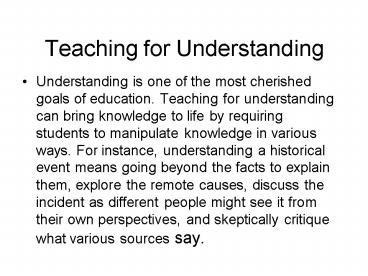Teaching for Understanding - PowerPoint PPT Presentation
1 / 27
Title:
Teaching for Understanding
Description:
What relationship do we see between thinking strategies and understanding? ... A Comprehension Quiz. A marlup was poving his kump. Parmily a narg horped some ... – PowerPoint PPT presentation
Number of Views:435
Avg rating:3.0/5.0
Title: Teaching for Understanding
1
Teaching for Understanding
- Understanding is one of the most cherished goals
of education. Teaching for understanding can
bring knowledge to life by requiring students to
manipulate knowledge in various ways. For
instance, understanding a historical event means
going beyond the facts to explain them, explore
the remote causes, discuss the incident as
different people might see it from their own
perspectives, and skeptically critique what
various sources say.
2
PEBC/GRREC LITERACY INSTITUTE THINKING
STRATEGIES OF PROFICIENT THINKERS
3
- Outcomes
- Participants will become familiar with
- Thinking strategies for proficient learners
- The importance of talk and collaboration to
deepen comprehension - The role of gradual release of responsibility in
planning for understanding - The importance of reflection writing to
synthesize new learning - The role of motivation and engagement in
understanding
4
Essential Questions
- What does it mean to understand?
- What relationship do we see between thinking
strategies and understanding? - What relationships do we see between planning and
understanding? - What role does assessment play in teaching for
understanding? - What role does motivation and engagement play in
understanding?
5
The Marlup A marlup was poving his kump.
Parmily a narg horped some whev in his kump.
Why did vump horp whev in my finkle kump? the
marlup jufed the narg. Erm muvvily trungy,
the narg grupped. Er heshed vump horpled whev in
your kump. Do vump pove your kump frinkle?
6
A Comprehension Quiz
- A marlup was poving his kump. Parmily a narg
horped some whev in his kump. Why did vump horp
whev in my finkle kump? the marlup jufed the
narg. Erm muvvily trungy, the narg grupped.
Er heshed vump horpled whev in your kump. Do
vump pove your kump frinkle?
- What did the narg horp in the marlups kump?
- What did the marlup juf the narg?
- Was the narg trungy?
7
Answers
- The narg horped some whev in his kump.
- The marlup juffed the narg Why did vump horp
whev in my finkle kump? - Yes, the narg was muvvily trungy.
8
- SO?
- Can you apply this knowledgeeven if you earned
an A? - Could you figure out a new use of this
knowledgeeven if you earned an A? - Can you build an argument about marlups if you
earned an A?
9
You Can Teach for Understanding
- Teaching is more than covering content, learning
is more than merely taking in, and assessment is
more than accurate recall. Meaning must be made,
and understanding must be earned. Students are
more likely to make meaning and gain
understanding when they link new information to
prior knowlege, relate facts to big ideas,
explore essential questions, and apply their
learning in new contexts. -- McTighe, Seif,
Wiggins
10
What is it that proficient readers and thinkers
do?
11
The questions that p face as they raise
c from i to adult life
are not easy to a . Both f and m
can become concerned when health
problems such as c arise any time
after the e state to later life.
Experts recommend that young c should
have plenty of s and nutritious food for
healthy growth. B and g should
not share the same b or even sleep in the
same r . They may be afraid of the d
.
12
The questions that poultry men face as they raise
chickens from incubation to adult life are not
easy to answer. Both farmers and merchants can
become concerned when health problems such as
coccidiosis arise any time after the egg state to
later life. Experts recommend that young chicks
should have plenty of sunshine and nutritious
food for healthy growth. Banties and geese should
not share the same barnyard or even sleep in the
same roost. They may be afraid of the dark.
13
Proficient Thinkers/Readers Draw on Schema
- They use their unique background knowledge to
understand the text as they read.
14
(No Transcript)
15
Proficient Thinkers/Readers draw inferences
- Inferring is the process of creating meaning by
connecting what is in the readers head with what
is in the text.
Aha!!!
16
Why is this funny?
17
Proficient Thinkers/Readers Ask Questions
- They generate questions BEFORE, DURING, and AFTER
reading.
18
JACQUELINE GRENNON BROOKS
- Teachers who teach for understanding also make
time for wonder.
19
Proficient Thinkers/Readers Determine Importance
in Text
I found it!
- And can support their ideas with evidence from
the text.
20
Proficient Thinkers/Readers
- Create sensory images as they read
21
Proficient Thinkers/Readers Also
- Synthesize parts to create a whole
22
(No Transcript)
23
David Perkins
- Students can only find and make meaning when they
are asked to inquire, think at high levels and
solve problems. McTighe, Seif, Wiggins
24
Proficient Thinkers/Readers
- Monitor for understanding
25
(No Transcript)
26
Understanding and Flexibility
- In a phrase understanding is the ability to think
and act flexibly with what one knows. To put it
another way, an understanding of a topic is a
flexible performance capability with an emphasis
on flexibility. In other words, when we truly
understand something, we can demonstrate that
understanding in a variety of ways and under a
range of conditions. David Perkins
27
Ellin Keene
- When we work hard to understand any concept or
idea whether a theme in a novel or a scientific
or mathematical concept we are building
intellectual muscle.

